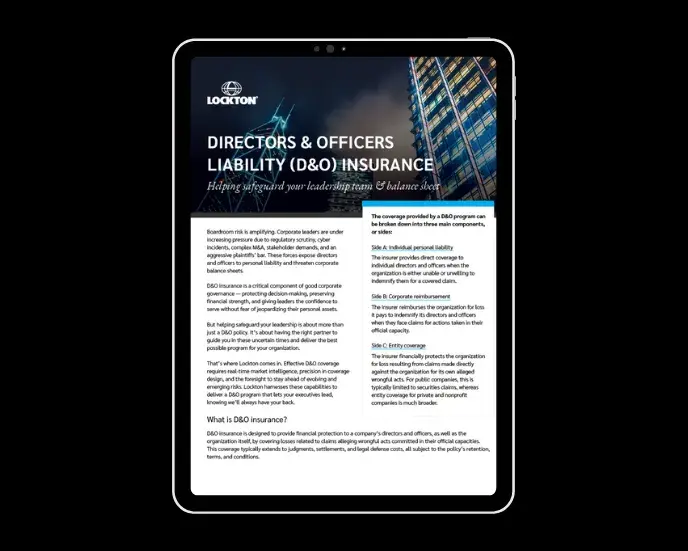Skip to main content



Lockton's D&O insurance is a critical component of good corporate governance — protecting decision-making, preserving financial strength, and giving leaders the confidence to serve without fear of jeopardizing their personal assets. But helping safeguard your leadership is about more than just a D&O policy. It’s about having the right partner to guide you in these uncertain times and deliver the best possible program for your organization. That’s where Lockton comes in. Effective D&O coverage requires real-time market intelligence, precision in coverage design, and the foresight to stay ahead of evolving and emerging risks. Lockton harnesses these capabilities to deliver a D&O program that lets your executives lead, knowing we’ll always have your back.
Helping safeguard your leadership team and balance sheet
Boardroom risk is amplifying. Corporate leaders are under increasing pressure due to regulatory scrutiny, cyber incidents, complex M&A, stakeholder demands, and an aggressive plaintiffs’ bar. These forces expose directors and officers to personal liability and threaten corporate balance sheets.
D&O insurance is a critical component of good corporate governance — protecting decision-making, preserving financial strength, and giving leaders the confidence to serve without fear of jeopardizing their personal assets.
But helping safeguard your leadership is about more than just a D&O policy. It’s about having the right partner to guide you in these uncertain times and deliver the best possible program for your organization.
That’s where Lockton comes in. Effective D&O coverage requires real-time market intelligence, precision in coverage design, and the foresight to stay ahead of evolving and emerging risks. Lockton harnesses these capabilities to deliver a D&O program that lets your executives lead, knowing we’ll always have your back.
What is D&O insurance?
D&O insurance is designed to provide financial protection to a company’s directors and officers, as well as the organization itself, by covering losses related to claims alleging wrongful acts committed in their official capacities. This coverage typically extends to judgments, settlements, and legal defense costs, all subject to the policy’s retention, terms, and conditions.

The coverage provided by a traditional D&O program can be broken down into three main components:

Who can be covered under a D&O program?
Coverage can extend to the following:
Directors
Officers
Trustees
Employees
Independent contractors
Staff members
Committee members
Volunteers
The corporate entity
Subsidiaries (with direct or indirect ownership greater than 50%)
Spouses and domestic partners
Estates and heirs
Claims management
Claim performance is the true measure of any D&O insurance program. Lockton’s Professional & Executive Risk Claims team is purposefully structured to help you maximize your insurance recoveries. Lockton does not silo claims, nor do we treat Claims Advocacy services as a profit center. Instead, we integrate experienced Insurance and Claims Counsel within your broking team. This ensures that claims strategy and advocacy begin at the very start of our partnership with you, so when a D&O claim does arise — we’re fully prepared.
Download our flyer
Learn how we help protect your leaders’ personal assets and your balance sheet by downloading our D&O Insurance flyer.
Download NowD&O FAQs
What are the most common types of D&O claims?
Common claim drivers include:
Societal or operational events such as the #MeToo movement, cyber security and data breaches, and the opioid crisis, collectively referred to as “event-driven litigation”
Environmental, social, and governance (ESG) concerns, including heightened focus on environmental policies and procedures, supply chain diligence, and allegations of “AI washing”
Misstatements, misleading statements, or restatements of financial reports
Breach of fiduciary duty resulting in bankruptcy, insolvency, or other financial losses
Allegations of failure to prevent bribery and corruption
Failure to comply with workplace laws and other employment-related claims
As governments across the world continue to tighten regulatory oversight, coinciding with a societal focus on individual accountability, the number and variety of claims made against directors and officers and the cost to defend them continue to increase.
Why do I need D&O insurance?
If you are a director or officer of any business, you should insist that your organization has D&O insurance in place as D&O insurance is a form of personal asset protection.
D&O insurance is often the last line of defense and kicks in when a company is unable or refuses to indemnify a director or officer.
I have an indemnification agreement with my company. Do I still need D&O insurance?
Companies often provide their directors and officers with indemnification agreements, and certain state laws require that directors and officers are entitled to indemnification to the fullest extent allowed by law. But it’s important to be aware that indemnification obligations might not always apply — for example, when:
Shareholders, on behalf of the company itself, bring a claim against you (derivative action).
Insolvency or financial distress could mean that there are no corporate funds available to satisfy the indemnity or that the funds are unable to be accessed due to bankruptcy procedure.
Indemnification is legally prohibited.

